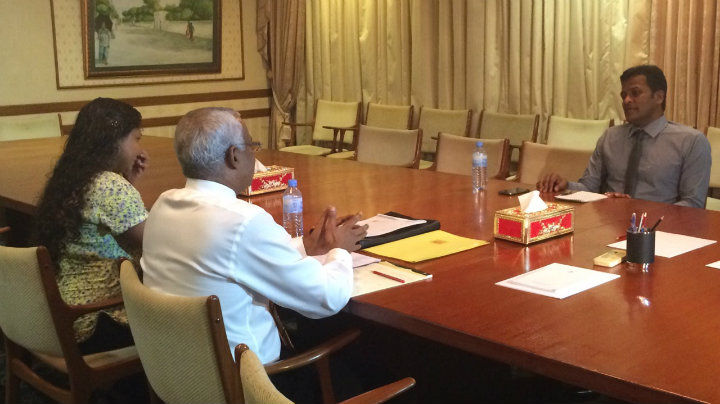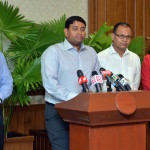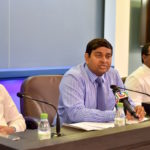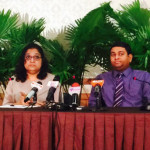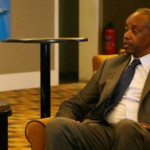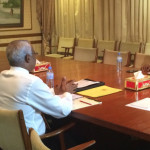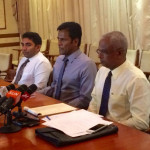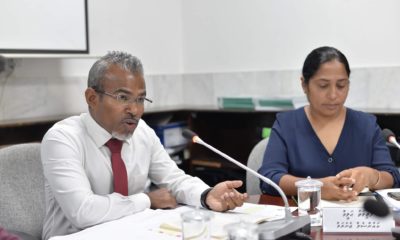The main opposition Maldivian Democratic Party has accused the government of attempting to scuttle the upcoming all-party talks by demanding council-endorsed representatives and ruling out negotiating with jailed opposition leaders.
The government renewed invitations for all-party talks in late September shortly after the Commonwealth’s democracy watchdog placed the Maldives on its formal agenda. Both the government and opposition at the time accepted the Commonwealth’s call for “time-bound dialogue without preconditions” to resolve a protracted political crisis.
“However, a series of letters from the president’s office show deliberate efforts to complicate the process by overstepping its mandate and dictating preconditions before the talks have even convened,” the MDP said in a statement on Monday.
Last week, the government sent letters to all political parties demanding that representatives must be approved by governing councils. The president’s office also informed the MDP in a second letter yesterday that “the government will not accept a nominee if the person is currently serving a sentence.”
The MDP said it has replied to the letters “reminding the government that it has no legal mandate to dictate internal matters of the parties.”
It added that the government is trying to prevent the participation of former President Mohamed Nasheed, whose imprisonment on a terrorism charge last year triggered the political crisis. The opposition leader was granted political asylum in the UK last May after he was authorised to travel for medical treatment.
“The MDP finds this turnaround by the government astonishing, given that, on the day the [Commonwealth Ministerial Action Group] decision was released, the government had announced that it did not have any preconditions,” the party said.
The party has yet to appoint representatives for the talks.
The MDP went on to accuse the government of attempting to “frustrate this party and other opposition parties to withdraw support from the talks”.
The president’s office spokesmen, Ibrahim Muaz Ali and Ibrahim Shihab, were not responding at the time of publication.
The president’s office also told the Adhaalath Party yesterday that its functioning and decisions at present are “questionable” as it lacks an elected leader.
Sheikh Imran Abdulla, the Adhaalath Party’s leader, is serving a 12-year jail sentence on a terrorism charge over a speech he gave at a mass anti-government rally on May 1 last year.
Both Nasheed and Imran were stripped of their leadership posts after the ruling party-dominated parliament changed the political parties law to bar convicts from holding posts.
Citing the government refusal to honour commitments made during negotiations in July last year, both the MDP and Adhaalath Party had previously demanded the release of their leaders before engaging in talks.
But the allied opposition parties set aside the condition after the CMAG meeting last month. The watchdog urged both sides to initiate dialogue “to achieve national agreement on institutional reform, and to ensure a conducive environment for credible and inclusive presidential elections in 2018.”
The CMAG also said that it would consider suspending the Maldives from the Councils of the Commonwealth if progress is not made by its next meeting in March 2017.
Fisheries Minister Dr Mohamed Shainee, the government’s lead representative for the talks, told reporters at the time that the government is open to discussing the release of opposition leaders.
The government will not impose conditions and talks will begin in mid-October when UN envoy Tamrat Samuel returns to the country, Shainee said.
Samuel’s efforts to spur dialogue with proximity talks failed earlier this year with both sides deadlocked over the release of political leaders. A follow-up visit in July also ended with no meaningful sign of progress.
The MDP meanwhile reiterated its call for the government to immediately engage in talks to avert suspension from the Commonwealth.
MDP Spokesman Hamid Abdul Ghafoor said the Maldives is at risk of becoming “an international pariah state” due to the current administration’s trajectory.
“While the MDP is committed to sincere dialogue, we are also concerned that President Yameen is using the talks to hoodwink the international community, while he buys time for him to fully change the Maldives into an autocratic state,” he said.

